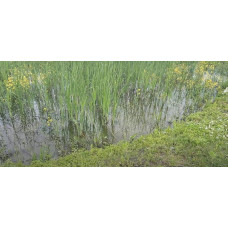Overgrowth - mass development of aquatic vegetation in a water body, which eventually ends in waterlogging of the water body. Occupying more than 25% of the water body area, aquatic plants reduce its fish productivity and worsen the hydrochemical regime. Excessive overgrowing usually leads to fish freezing.
Overgrowths reduce the most productive area of a water body, as the bottom of the areas occupied by them is inaccessible for fish. Aquatic plants use biogenic elements (phosphorus, calcium, potassium, nitrogen, trace elements, etc.) from soil and water, which are necessary for the development of useful phytoplankton. Powerful entanglements of plant root system impair the exchange between soil and water, soil aeration, inhibit the activity of useful soil microorganisms. When dying off, some plants consume a lot of oxygen dissolved in the water during decomposition, causing at high density of fish planting summer frost. At annual dying off of plants the bottom of the reservoir is covered with poorly decomposing remains of them, thus the processes of mineralization of the finest mud sediments are slowed down.
All plants prevent the sun from illuminating the water column and bottom, warming it, as well as the action of the wind and the natural aeration of the water.
Overgrowth
Tags: overgrowth

